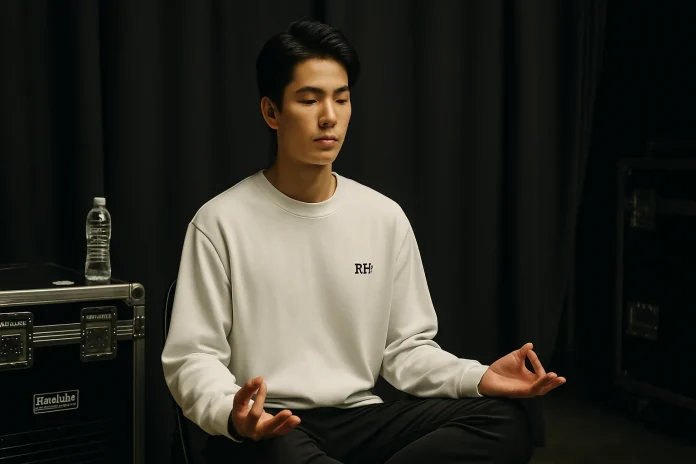K-pop mental wellness is finally becoming a priority in the industry. Behind the glamor, synchronized choreo, and flawless visuals lies a demanding lifestyl. From intense schedules to constant public scrutiny, idols face extraordinary pressure — but many are now prioritising mental wellness through routines, company support, and personal reflection.
Discover how K-pop mental wellness is evolving as idols manage stress through rest, routines, therapy, and fan support.
1. Routines That Support K-pop Mental Wellness
Many idols incorporate daily habits and self-care to stay mentally strong despite their chaotic schedules. These include:
- Journaling or gratitude logs to reflect and release stress
- Daily workouts or dance practice as a physical release
- Meditation, yoga, or breathing exercises (used by artists like Taeyeon and Kang Daniel)
- Digital detoxes by stepping away from social media on off-days
These practices help idols maintain balance and reconnect with themselves amid the noise of fame.
2. Rest and Schedule Flexibility: A New Trend in K-pop
In recent years, major agencies such as HYBE, JYP, and SM Entertainment have begun implementing rest periods and flexible schedules for their artists.
Examples:
- BTS took an extended break in 2022 to focus on individual growth and recharge.
- TWICE’s Jeongyeon paused group activities to recover from anxiety and health issues.
- ATEEZ’s Mingi took time off to recover from anxiety before rejoining with full strength.
This shift acknowledges that mental recovery is as important as vocal or dance training.
3. In-House Mental Health Service
Some entertainment companies now offer access to therapists or counsellors as part of their artist support system.
- JYP Entertainment revealed they have professional therapists on staff
- Smaller companies like Pledis and FNC have followed suit by offering psychological support
- Some idols, like Heechul (Super Junior), have spoken publicly about receiving therapy
These services are confidential and help idols deal with performance anxiety, burnout, or even long-term trauma from training.
4. Talking Openly About Mental Health
The taboo around mental illness is slowly lifting in Korea — thanks in part to idols who have chosen to speak out.
Notable voices:
- IU has discussed struggling with depression and her need for space to reflect
- Suga (BTS) spoke about therapy and the importance of acknowledging your limits
- EXO’s Baekhyun emphasised the pressure of perfection and needing emotional release
- Taeyeon (Girls’ Generation) has been open about battling depression, encouraging fans to seek help too
These conversations are empowering fans and fellow artists to take mental health seriously.
5. Fan Support and Mental Health Campaigns
Idols also draw strength from their fans — and in turn, participate in mental health awareness projects.
- ATEEZ’s San has openly thanked fans for helping him cope with emotional lows
- BTS’s Love Myself Campaign with UNICEF promotes self-care and anti-violence education globally
- Day6’s lyrics often talk about anxiety, loneliness, and the importance of seeking help
Fans are also creating support accounts to check in on idols, send positivity, and normalise mental health discussions.
Final Thoughts
The conversation around mental health in K-pop is evolving. While the pressure of idol life hasn’t disappeared, the industry and its stars are now actively working toward healthier lifestyles.
Whether it’s therapy, rest breaks, journaling, or simply unplugging, K-pop idols are proving that strength isn’t just about stage presence. It’s also about knowing when to slow down, speak up, and take care of your mind.



